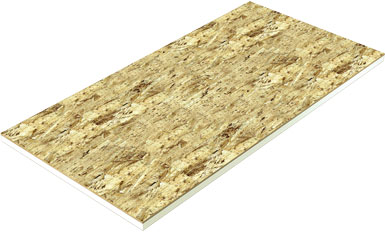

Description
Thermally efficient closed-cell ACFoam®-II or ACFoam®-III polyisocyanurate (polyiso) insulation board bonded to min. 7/16” APA/TECO rated OSB or min. 19/32” CDX plywood on the top face. ACFoam Nail Base is offered in a variety of composite thicknesses, providing long-term thermal resistance (LTTR) values from 6.3 to 24.2. Made to order in 4ft x 8ft (1220mm x 2440mm) panels with a nominal thickness of 1.5” to 4.5”. Manufactured in accordance with ASTM C1289, Type V.
| 2LTTR VALUE | THICKNESS | 3RSI | FLUTE SPANABILITY | ||
|---|---|---|---|---|---|
| in | mm | in | mm | ||
| 6.3 | 1.5 | 38.1 | 1.10 | 4.375 | 111.13 |
| 9.1 | 2.0 | 50.8 | 1.60 | 4.375 | 111.13 |
| 12.0 | 2.5 | 63.5 | 2.10 | 4.375 | 111.13 |
| 15.0 | 3.0 | 76.2 | 2.63 | 4.375 | 111.13 |
| 18.0 | *3.5 | 88.9 | 3.16 | 4.375 | 111.13 |
| 21.1 | *4.0 | 101.6 | 3.70 | 4.375 | 111.13 |
| 24.2 | *4.5 | 114.3 | 4.25 | 4.375 | 111.13 |
2 LTTR (long term thermal resistance) values were determined in accordance with CAN/ULC-S770-09. Test samples were third-party selected and tested by an accredited material testing laboratory. The LTTR results were reviewed by FM Global and certified by the PIMA Quality Mark Program. 3 RSI is the metric expression of R-value (m2 • K/W).
* To minimize the effects of thermal bridging, Atlas strongly recommends the use of multiple layers when the total desired or specified R-value requires an insulation thickness greater than 2.7” thick.
| PROPERTY | TEST METHOD | RESULTS |
|---|---|---|
| DIMENSIONAL STABILITY | ASTM D2126 | < 2% |
| COMPRESSIVE STRENGTH | ASTM D1621 | 20 psi (140 kPa) or 25 psi (172 kPa) |
| WATER ABSORPTION | ASTM C209 & D2842 | < 1.0%, < 3.5% |
| WATER VAPOR TRANSMISSION | ASTM E96 | < 1.0 perm (57.5ng/(Pa•s•m2)) |
| PRODUCT DENSITY | ASTM D1622 | Nominal 2.0 pcf (32.04 kg/m3) |
| FLAME SPREAD | ASTM E84 (10 min.) | 140–60 |
| SMOKE DEVELOPMENT | ASTM E84 (10 min.) | 150–170 |
| TENSILE STRENGTH | ASTM D1623 | > 730 psf (35 kPa) |
| SERVICE TEMPERATURE | – | -100°F to +250°F |
1 Numerical ratings are not intended to reflect performance under actual fire conditions. Flame spread index of ≤75 and smoke development ≤450 meet code requirements for foam plastic roof insulation. Codes exempt foam plastic insulation when used in FM 4450 or UL 1256. Physical properties listed above are presented as typical average values as determined by accepted ASTM test methods and are subject to normal manufacturing variation.
- ASTM C1289, Type V
- UL Standard 1256 Classification Construction No. 120, 123 & 458
- UL Standard 790 (ASTM E108) For use with Class A, B or C Shingles, Metal or Tile Roof Coverings
- UL Standard 263 (ASTM E119) Fire Resistance Classification
- UL Standard 1897 Uplift Resistance
- FM Standard 4450/4470 Approved (1-90, 1-105) Approved for Class 1 Insulated Roof Deck Construction. Refer to FM Approvals® RoofNav for Specific System Details
- IBC Chapter 26 & NBC Sections on Foam Insulation
- California State Insulation Quality Standards and Title 25 Foam Flammability Criteria (License #T 1231)
- Miami-Dade County Approved
- State of Florida Product Approval (FL17989)
- APA/TECO Rated OSB Nailing Surface
- U.S. Voluntary Product Standard PS 2 Compliant

